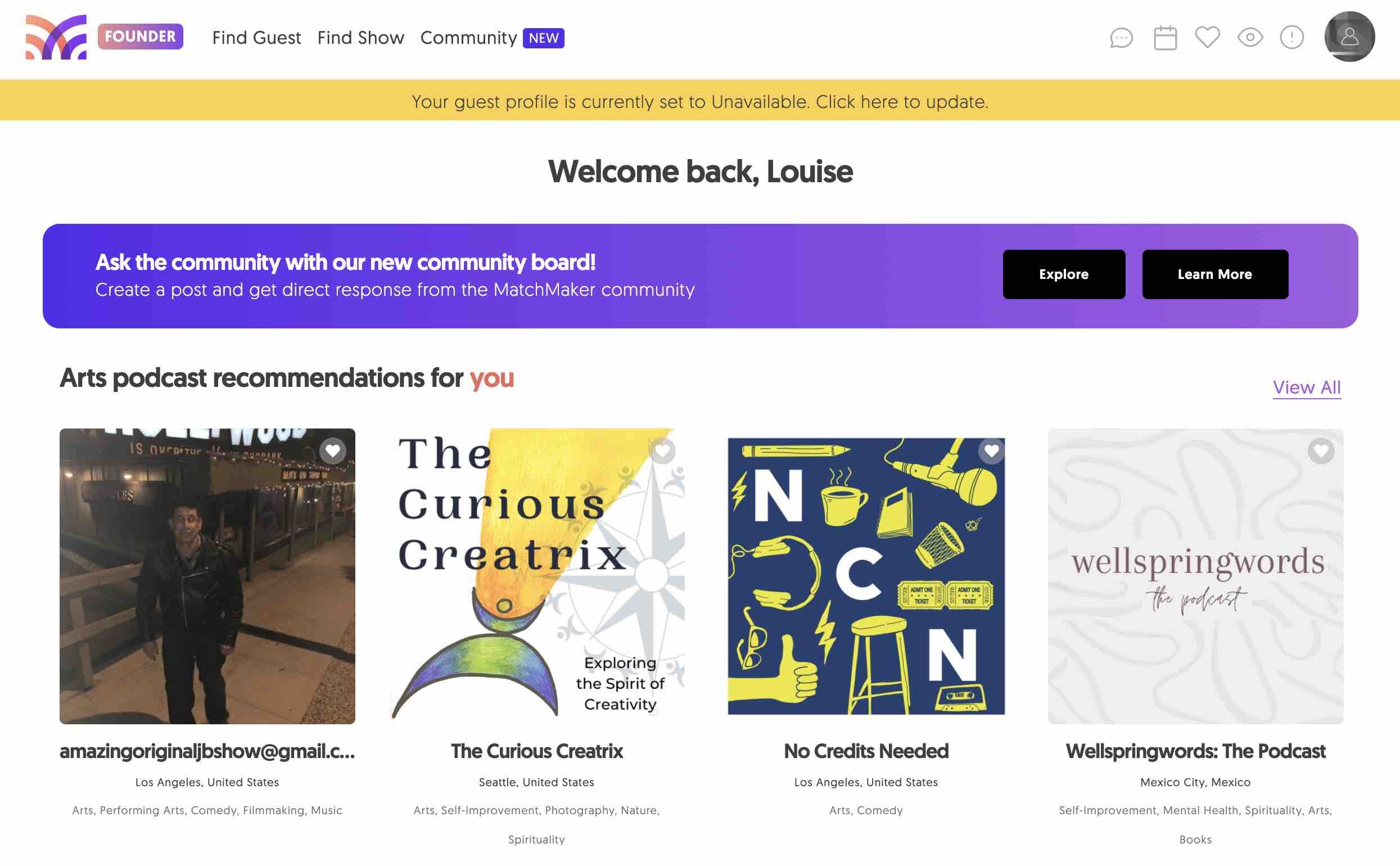There’s no denying that producing a podcast takes a lot of work. Especially a high-quality one. Having said that, it’s doable if your job isn’t too demanding and you’ve got plenty of spare time to dedicate to it. If you’re already very busy however, or you’re running your own business, producing a great podcast can be a lot more challenging, time-wise at least.
Because there’s already a lot of competition in the industry, shows that lack high-quality production often don’t stand a chance at making it. And that’s why it’s always smart to invest in your show and do it well. For many who are serious about growing their show, this means outsourcing certain aspects of the production process to a producer.
We recently spoke to Noah Labhart (host of Code Story) about why he chose to outsource various parts of his podcast. Bear in mind that Noah is also the CTO and co-founder of Veryable, so he was naturally very busy and finding it virtually impossible to do everything himself. Here’s what he said:
“I really wanted to do it all myself, but it was taking me so long to get each episode done. I’m married with three kids, running a startup, and I’m also a podcast host. That leaves me with very little free time. So I finally realised that I needed to get out of my own way to make Code Story happen.”
My producer immediately grasped my vision for the show, and knew exactly what I was looking for.
“So I ended up hiring an editor to help me finish season one, and he did a fantastic job. He immediately grasped my vision for the show and knew exactly what I was looking for. And then I also hired a freelancer to help promote the episodes. She handled all the social media promo for the podcast and also ran the newsletter to help get the word out. I don’t think I could have done it without that additional help.”
If you want to create better content at a much faster pace, hiring a podcast producer is one of the only ways to do it. Every show is different however, and it’s up to you to decide where you could use some extra help. Make sure you keep tabs on your current production process and make note of which tasks are taking you the most time to complete. It’s these that you should prioritise rethinking your strategy for.
The Day-to-Day of a Podcast Producer
The production needs of every show are different, but generally, a podcast producer will look after the technical aspects. And that can be anything from sound design, to visual assets, to scriptwriting. It’s completely up to you to figure out what you need help with. Below are 8 different tasks you can outsource to a producer - have a think about which one would benefit you and go from there.
1. Audio or Video Editing
There’s no doubt about it that podcast editing eats up a lot of time. Sometimes double the amount of time of the actual recording, if not more. Because of this, it’s probably the most commonly outsourced element of podcast production. It also requires a certain degree of technical skill and know-how to get it right. Many entrepreneurs and branded podcasts will hire a podcast producer to save time.
If this is something you’re interested in, there are loads of freelance editors to choose from. But before you hire someone, make sure you feel confident they understand your vision. Ideally, you should be able to hand them your raw audio or video files and leave it up to them to decide which parts to edit. They’re the experts, after all. Finding someone you’re confident in means you won’t feel the need to make constant revisions and changes to their work. That’s where you’ll save yourself a lot of time.
2. Pre-Interview Research
It goes without saying that a good interview requires good preparation. Interviewers need to have a solid understanding of who they’re speaking to and what their expertise is. This usually involves Googling them, checking out their socials, and listening to other interviews they’ve done. Making notes and jotting down talking points is good practice, but it’s also something that takes time.

You can speed this process up by hiring a freelance researcher. They’ll take care of all the background digging and prepare some notes on each guest. You should still make the effort to understand who your guest is yourself, but cutting down the amount of time you spend searching for information can help to optimise your production workflow.
Note: If you’re new to podcasting, doing the research yourself (especially for the first year) is strongly recommended. It’s key to becoming a better interviewer.
3. Script Writing
Having a pre-prepared script to refer to during your recording is always a good idea. It stops you rambling, deters any awkward pauses, and keeps you on course throughout. That goes for any type of show too - solo, co-hosted, interview, or roundtable.
But because good writing takes time, preparing a fresh script for every episode might not be feasible for you. If that’s the case, you might want to hire a script writer. They’ll listen to your ideas and craft them into a coherent, logical script with a beginning, middle and end. Writers will also be able to help you generate compelling ideas for future episodes.
When working with a podcast script writer, it’s important they understand your podcast’s tone of voice and style. Take the time to shop around until you find a writer you feel confident in. You’ll also need to put together a good brief for them to follow. If you can paint a clear picture of your vision, they should be able to write something great.
4. Podcast Artwork and Imagery
It turns out first impressions really do matter. So if your podcast artwork looks like it was created on Microsoft Paint, you might want to think about hiring a graphic designer.
When making this decision, have a look at your current artwork and think about the following questions. Does it look professional? Is the text / font easy to read? Does it get across the central theme or message of your show? If not, then there’s your answer. Graphic designers will also help you redesign anything visual you’re putting out on social media.
Remember you want your show to rival those produced by top-tier production houses. A small investment here goes a long way.
5. Guest Booking & Management

Finding and booking guests is time consuming. There are no two ways about it. But if you can find a way to cut this process down, you’ll save yourself a lot of time and hassle.
That’s where MatchMaker.fm comes in. It’s the leading podcast-to-guest matchmaking service which allows you to contact and book expert guests. And because you can also arrange to be a guest on other shows yourself, it’s great exposure for your show, business, and brand.
It only takes a few seconds to create a profile. And once you’re set up, you’ll be able to start taking guest bookings and filtering podcasts by categories. And if you’re one of those clever bilingual individuals, you can search by language spoken as well.
When you find guests you love, you can either favourite them later or contact them immediately via MatchMaker’s instant messaging service. While MatchMaker.fm isn’t strictly outsourcing production, it’s completely free to use and it streamlines the whole guest booking and management process.
If you’d rather take a completely hands-off approach to guest management, virtual assistants can take care of all the administrative work associated with pitching, booking, and following up with guests - allowing you to focus on creating great content.
6. Show Notes
Like scripts, putting together episode show notes is another hefty writing task. And if you’ve got a regular publishing schedule, doing so can become a burden. It can be tempting to abandon writing show notes altogether, but if you’re serious about growing your audience, we wouldn’t recommend doing so.
Engaging show notes are the only way to direct SEO traffic to your episodes. You need them. Google’s algorithm can’t “hear” your episodes, so it needs to be able to “read” them instead.
If show notes are something you’re struggling to make time for, hiring a freelance copywriter might be a good idea. They’ll listen to each episode, craft compelling descriptions and titles, break down each episode into timestamps, and include any links that are relevant to the episode.
7. Repurposing Episodes Into Other Formats
Repurposing episodes into other formats is crucial for driving engagement. Sharing a random link to your new episode on social media will only get you so far. It requires a bit more effort to earn new listeners. To give you an idea, you might want to try a couple of the below options:
- Social media images and posts
- Transcripts
- Long-form blog posts
- Audiograms and video teasers
- Downloadable PDFs
Whilst we’d always say that taking the time to create extra assets is worthwhile, there’s no denying it’s a time consuming task. Especially if recording your show is taking up a big chunk of your week as it is. So if you don’t have a wider team working with you, outsourcing your podcast content repurposing is an option.
Haylee Gaffin hosts the Clocking In podcast, where she recently spoke about how outsourcing her own podcast production has been beneficial. Alongside her podcast, Haylee also runs Gaffin Creative, and like Noah, she was struggling to juggle both workloads. She said:
“A lot of my content creation and marketing is now outsourced, because when my client work needs to be prioritised, I know this stuff (content) will fall off my radar. Plus, doing these extra things, like content repurposing, when I’ve been working with clients all week is not my favourite thing to do - so I found outsourcing to be very valuable to me in terms of time.”
When client work needs to be prioritised, content creation tends to fall off my radar.
“This year I hired an additional copywriter to help with the blogs on my website, and an additional editor. My goal is to build this team, and to grow my business that way.”
Listen to the full episode using the business below:
8. Social Media Management
Once you’ve actually repurposed your podcast content into other forms, you’ll still need to schedule it. A simple task on the surface, but one that can take up a lot of time. Anyone who’s well-versed in social media might be able to take care of it themselves with the help of a scheduler, like Buffer or Later. They let you easily schedule posts in advance, meaning you won’t have to do everything on an adhoc basis.
If social media isn’t your strong point however, or you don’t have the time to spare replying to comments, you can hire a freelance social media manager. They’ll do it all for you, helping you drive more downloads and listens of your latest episodes.
Where to Find Podcast Producers & Freelancers
If you feel like you need some help producing your podcast, the option is always there to outsource certain tasks. Maybe you need some copywriting help, or a graphic designer to take care of your visuals.
Hiring a freelancer can be really liberating, stress-relieving, and time saving. You don’t have to do it all yourself. We’d recommend using Fiverr - the leading marketplace for freelancing services. Remember that you get what you pay for though, so don’t just go for the cheapest option.
Make sure you spend some time working out which person will be the right fit for your show. You should be able to picture yourself having a good working relationship with them too, and you must feel confident trusting them with your vision. Prices will differ depending on the profile and portfolio you’re looking at, but here’s a general guideline for what you can expect to pay.
- Audio or Video Editor: $100 per week
- Researcher: $150 for basic research
- Script Writer: $50 per page
- Copywriter: $100 per 500 words
- Graphic Designer: $60 for 5 images
- Social Media Manager: $250 per month
Working With a Podcast Production Agency
If you’re a bigger brand with a production budget to work with, you might decide to partner up with a production agency. An agency will handle everything from the initial concepting stage, right down to promotion and distribution.
That’s exactly what we offer over at Cue Podcasts. You can check out our showreel below:
Cue is a full-service production agency that specialises in giving brands a voice - balancing creativity, collaboration, and technical excellence to reach desired target audiences.
The first thing we'll do is work with you to gain a solid understanding of your existing audience, your goals, and your brand to develop initial concepts and themes. We’ll also carry out audience research, format development, business goal alignment, content mapping, artwork creation, and host sourcing.
Get one of our expert podcast producers to look after your entire show from start to finish.
Once the concepting phase is complete, our team will assist and direct you while you record - whether on-location in one of our studios or remotely over video link. You’ll be assigned a dedicated producer who will take care of all the audio mixing and mastering, sound design, show notes, and recording equipment.
Once your episodes are edited, we'll distribute them to all the major players (including Apple and Spotify) via our super-fast hosting platform. And after launch we'll help maximise your reach with a tailored marketing strategy across social channels, web content, and email. This can include audiograms, social posts, blog posts, paid ad campaigns, and more.
Lastly, we’ll keep you updated with how your podcast is performing, with weekly analytic insight reports. This allows you to see which of your episodes are most popular with listeners so you can double down on the things that work.
You can check out some of our recent production work below:
Want to learn more? Head over to the Cue website and let us know your requirements to receive a production proposal and pricing quote.









